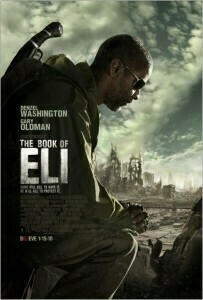Blog
THE BOOK OF ELI (2010): A Review

When you put together a film designed to juxtapose the guiding light of religion and faith with the bleak world of a post apocalyptic society, the last thing you’d wager a filmmaker would want to leave the audience with is a feeling of indifference. Unfortunately, with it’s paper thin characters, miscast actors and plot cobbled together from dozens of films that came before it, The Book of Eli takes these elements and reduces them to a grey-brown mixture of ineffectiveness, much like the color palate of the film.
The movie starts off strong enough, casting Denzel Washington as Eli, a man wandering through a world reduced to a sun-bleached pile of rubble. It’s in these opening moments that the film is strongest - shot wonderfully on the digital camera of the day, the Red One camera, with a beautiful Nine Inch Nails circa Ghosts I-IV style score by Atticus Ross. It places Eli almost as a wasteland equivalent of the classic wandering samurai, moving from location to location, fighting those who stand in his way and incur his wrath. Honestly, I could’ve gone for two hours of just this.
Shortly after a gory and brutal fight sequence, Eli arrives in one of the few settlements remaining in this desolate world, a town lead by Carnegie (Gary Oldman), a corrupt mayor with a taste for books. It’s here that the film starts to sputter out, just inches away from the starting line. Carnegie is after the last remaining copy of the Bible, a book which Eli so happens to have - something Carnegie doesn’t know. But after Eli gets into another scuffle, this time with Carnegie’s men, Carnegie decides he wants Eli to be part of his “crew”, an understandable thought given that Eli just murdered 90% of his men. And Carnegie, being the paper thin corrupt leader stereotype which Gary Oldman is trying to breathe life into, tempts Eli with everything he can. Food, water, and even his own “stepdaughter”, Solara (a painfully miscast Mila Kunis). But Eli is a man of faith! He must continue on his trail to the “West”. These temptations do not stop him. And even at the threat of personal harm, Eli continues on.
Of course, this isn’t without a few hitches, the first of which being Solara. Solara, now playing the role of the sidekick that won’t leave the hero alone, continues to follow Eli, despite his warnings that the world isn’t safe for a pretty lil' girl like her. Which brings me to my biggest problem with Kunis in this role. Mila Kunis can do great work - when given the right script. I thought she was the heart and soul of Forgetting Sarah Marshall! But with her perfect looks, nary a hair-out-of-place style, and general lack of grime (compared to the other characters), she stands out like a sore thumb in this bleak future.
As I’m sure you can imagine - with Eli leaving his town with the Bible (and with Solara in tow), Carnegie and his men follow them West, into a clunky third act. Strangely enough, this is where the movies most effective scenes (minus the stunning opening) lie, but by juxtaposing a rather humorous sequence with two older residents of a farm alongside a wonderfully shot shootout sequence which had me recalling the best moments of Children of Men, the effectiveness of both scenes is rendered null and void.
And it’s from here that the movie rushes to wrap up every loose end, combining a sequence lifted directly from Children of Men (rowboat with important cargo), a twist ending which feels tacked on (and I doubt would hold up on a second viewing), and a hamfisted hint towards a sequel - or trilogy, given that studios love them these days - leaving me feel cold. You’d think a film which is based in faith and religion would leave you fired up, but instead, none of the passion of Eli for his beliefs, or Carnegie for his…uh…want to run more cities? (it’s barely addressed), or Solara’s want to…uh…do…something(?)can be felt at any time during the film. It’s a zero sum game.
It’s a shame when you can tell that the crew of a film worked so hard to bring their A-Game to a project, but The Book of Eli proves beyond a shadow of a doubt, no matter how many great actors you pair together, no matter how many great films you crib from, at the end of the day, it can be rendered ineffective if the passion never makes it to the screen.
Thursday January 14, 2010